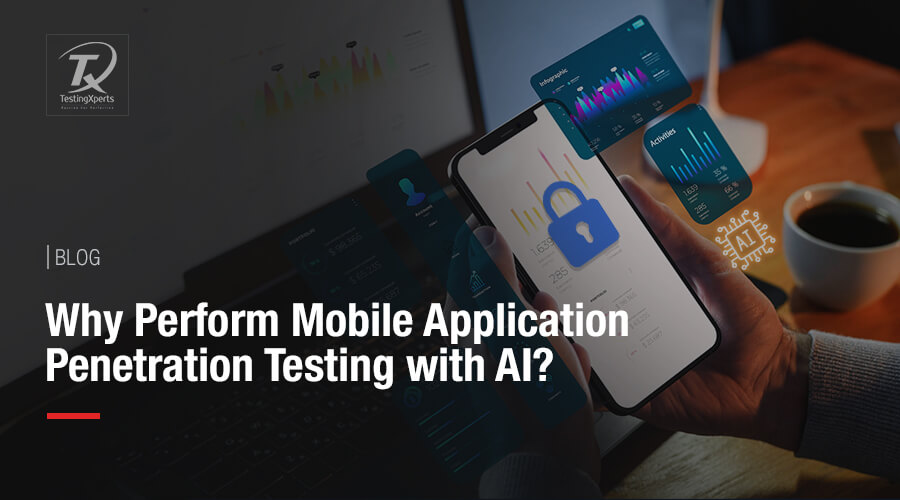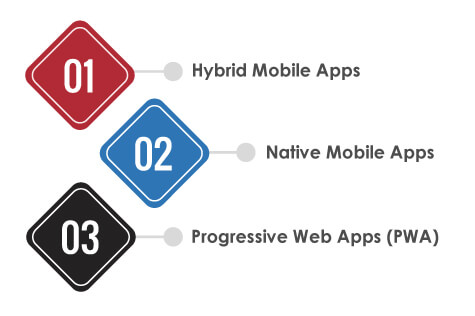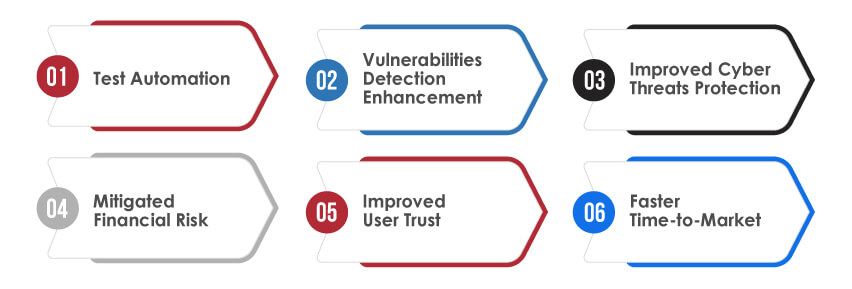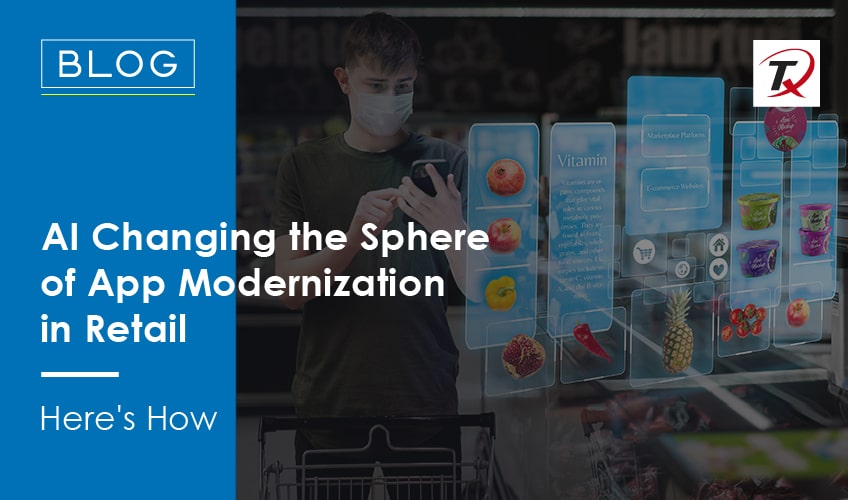
- An Overview of AI in Mobile Application Penetration Testing
- Types of Mobile Apps that Businesses Use
- Benefits of Mobile App Pen Testing with AI #How can Tx help with Mobile Application Penetration Testing?
- Popular AI Mobile App Testing Tools
- How can Tx help with Mobile Application Penetration Testing?
- Summary
Why is AI becoming a core aspect of mobile application penetration testing? Mobile apps have become an integral part of everyone’s lives. They have come a long way since the early 2000s. Now, a single app can work across smartphones, laptops, home appliances, and smartwatches. Thus, the chances of cyber threats and data breaches targeting these apps have also increased, raising concerns about the serious consequences they may cause, like financial fraud, identity theft, data loss, etc. Mobile apps are part of a larger tech ecosystem, constantly communicating with servers, data centers, and networks, thus expanding the attack surface.
This is why traditional pen testing methods are insufficient to secure mobile apps. They are constantly targets of complex security vulnerabilities like server-side request forgery attacks, which exploit app logic’s deeper layer and system configurations. That’s why it is necessary to shift toward AI solutions to transform how pen tests are conducted, offering faster and more thorough insights. AI-based tools assist security teams in enhancing test efficiency, integrating seamlessly into DevSecOps, and ensuring security measures are scalable.
An Overview of AI in Mobile Application Penetration Testing

Artificial intelligence (AI) is crucial in app penetration testing for several reasons. It can automatically generate test cases and scripts. Businesses can use AI/ML algorithms to analyze app behavior and user patterns, identify test scenarios, and automate them, saving testing teams time and effort. AI algorithms analyze past data (including usage patterns and user feedback) to help businesses prioritize test cases based on failure chance. This decreases the failed QA instances and their impact on testing resources.
AI helps automate app defects and anomaly detection by analyzing code patterns and correlating irregularities with previous data. ML models identify unnoticed issues that were missed by traditional testing methods. It also assists in analyzing user behavior, feedback, and preferences to optimize UX. Conventional AI and GPT-driven solutions are some of the cost-effective alternatives to traditional mobile application pen testing approaches.
Following are the 5 parameters to test during a mobile application penetrating test:
- Authentication and Session Management
- Network Communication
- Data Storage and Privacy
- Architecture, Design, and Threat Modelling
- Misconfiguration Errors and Build Setting
Types of Mobile Apps that Businesses Use

In today’s dynamic digital ecosystem, businesses use various mobile applications to optimize their operations and drive growth with customer engagement. Let’s take a look at three types of mobile apps that businesses use to address their requirements:
Hybrid Mobile Apps: These apps are a midpoint between broader reach and native app functionality. Businesses use web technologies like CSS3, JavaScript, and HTML5 to build and run these apps within a native app container, which allows them to function across platforms. Education is a prime example of an industry using hybrid apps to facilitate online and offline functionalities, data visualization, task management, and communication features.
Native Mobile Apps: These apps are developed for specific platforms like iOS or Android. Companies use different programming languages, such as C++, Java, Python, React, Swift, and Objective-C. These apps give full access to device features, making them beneficial for tasks like high-performance gaming with ultra graphics, mobile banking with secure transactions, etc. Gaming and financial industries heavily rely on native mobile apps.
Progressive Web Apps (PWA): PWAs are web-based apps accessed on any browser. They are alternatives to native apps and comprise features like offline activity and push notifications. Users who need quick access to features or data can use these apps without going through the hassle of the app download process. eCommerce stores, travel, and hospitality apps are some examples of PWAs.
Benefits of Mobile App Pen Testing with AI

Leveraging AI in mobile application penetrating testing can benefit businesses in terms of security and app robustness enhancement. Evolving cyber threats are a major concern in today’s tech-driven world. Thus, integrating AI tools can benefit in the following ways:
Test Automation: AI tools can automate repetitive QA tasks, bug identification, and user interaction simulation, providing a clear picture of test coverage and helping reduce manual testing efforts.
Vulnerabilities Detection Enhancement: AI algorithms help identify patterns and bugs missed during traditional testing processes. This is handy for detecting complex cyber threats, including zero-day vulnerabilities and business logic errors, which are rapidly increasing in modern applications. AI-based pen tests engaged in advanced attack scenarios, ensuring subtle and complex errors get detected before hackers can exploit them.
Improved Cyber Threats Protection: Security teams can automate and regulate the security testing process to identify vulnerabilities, which improves protection against cyber threats. This will prevent hackers from exploiting vulnerabilities as they will be identified and addressed in advance.
Mitigated Financial Risk: The financial impact of data breaches can be avoided by proactively identifying and addressing mobile app vulnerabilities. Investing in AI-based security testing will reduce the damage repair costs caused by cyber-attacks.
Improved User Trust: Companies who do not invest in the security parameters of their products are most likely to lose their competitive edge in the market. Users prioritize data privacy and security when selecting apps, benefiting businesses with robust security measures in their mobile applications.
Faster Time-to-Market: Leveraging AI-based tools for application pen testing accelerates the QA process, enabling faster bug detection and prevention. This helps reduce testing time, accelerating time-to-market with quicker release cycles.
Popular AI Mobile App Testing Tools

Checkmarx: Checkmarx is a mobile app security testing tool and cloud-native AppSec platform that allows businesses to identify and mitigate security flaws in their mobile apps. It offers multiple security solutions to cover the entire development lifecycle. Its key features include SAST (static app security testing), SCA (Software composition analysis), API security, AI security, SSCS (supply chain security), and DAST (dynamic app security testing).
Kobiton: Kobiton is a mobile testing platform specializing in offering real devices for test automation. Its cloud-based solution allows businesses to test mobile apps on varying devices. Kobiton offers both manual and automated testing on real devices and ensures comprehensive test coverage while enabling teams to select the best testing approach.
Applitools: Applitools is a visual testing and monitoring platform emphasizing visual AI. It offers a unique mobile automation testing approach by automatically detecting visual bugs and errors across apps and devices. Its advanced AI technology allows testers to identify and address visual bugs with precision.
Katalon Studio: Katalon Studio is an integrated AI mobile automation tool that offers a comprehensive set of tools for desktop, web, API, and mobile app testing. It combines an intuitive UI with rich features, including a built-in test recorder and advanced scripting using Java, Groovy, and JavaScript.
How can Tx help with Mobile Application Penetration Testing?

Tx is a leading QA partner for complete security solutions regarding mobile application penetrating testing. We offer comprehensive testing solutions that deliver incomparable value to our clients with unique quality needs to avoid false positives. Our pen testing services cover both iOS and Android platforms. The highly certified cybersecurity experts at Tx utilize advanced AI-based tools and technologies to protect your app from possible cyber threats. Our AI-based in-house test automation framework, Tx-Automate, helps streamline your test automation efforts while enhancing the effectiveness and efficiency of your mobile apps. Our mobile testing capabilities ensure your mobile apps meet the highest security standards, regardless of industry or platform.
Summary
In essence, the rise of AI in mobile application penetration testing, supported by tools like Checkmarx, Kobiton, Katalon Studio, etc., makes a transformative shift in efficiency. AI-powered solutions have improved mobile testing processes and upscaled app quality from bug detection and performance monitoring to test case generation. AI-based mobile app pen testing can assist you in staying competitive, delivering highly secure apps, and meeting UX standards in the dynamic digital world. Contact our experts now to find out how Tx can assist you with mobile application penetration testing




